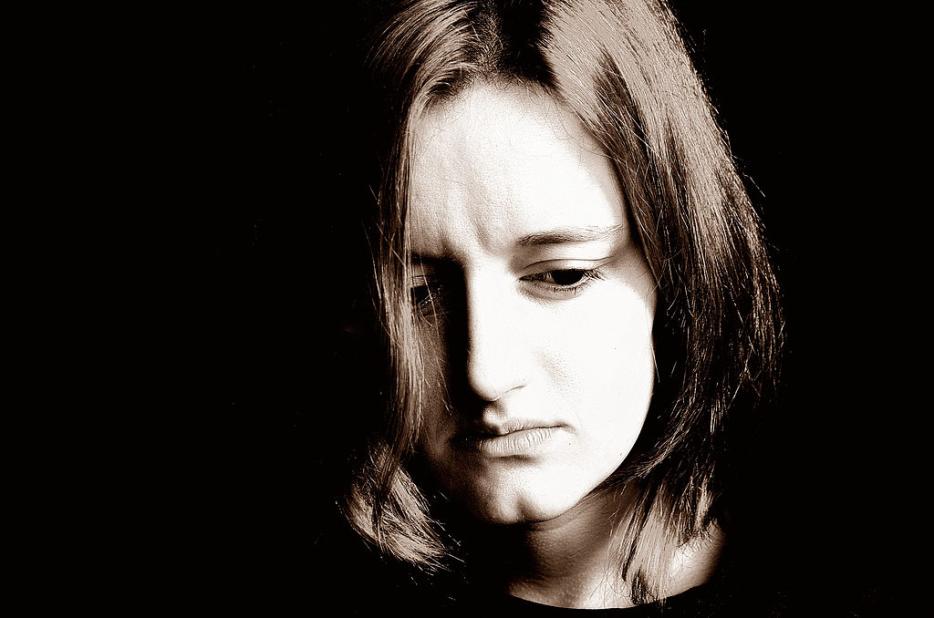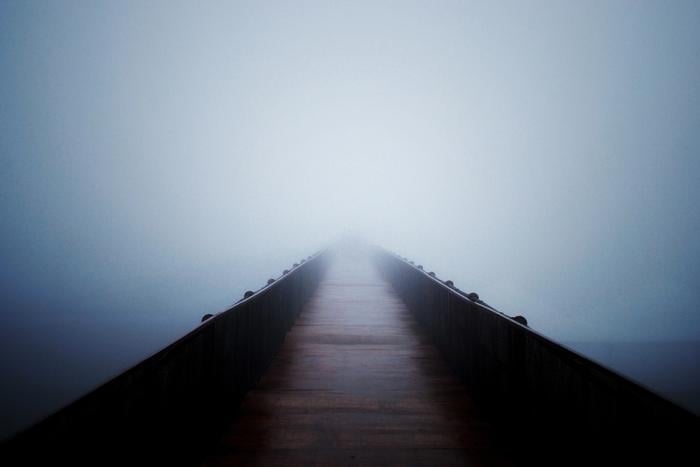We met outside the funeral home after my brother Robert died. He tried to pass an eighteen-wheeler on a two-lane highway in February, swerving as the mini-van emerged from the blowing snow in the opposite lane. He failed. My father had them burn what was left of Robert so my mother wouldn’t have to see the pieces. I read a poem at the ceremony.
“He was a good man,” Candace said, waiting outside in the cutting wind. Flurries gathered in the thick blonde hair piled up on her head. Robert was barely twenty two. Still a boy.
“I know, I know.”
“He would bring coffee over when he went on a run, you know? He’d ask me about my dog, my friends. Just so kind in that way.”
Candace’s skin gleamed even with the dense clouds overhead. Robert did not ask people about dogs. Robert must have had his eyes on her, the dentist’s receptionist right there beside the mechanic’s shop. All his girlfriends had been products of proximity.
He was my brother, but he was not nice.
“Just such a giving soul, you know? He will be missed by so many of us. I am so sorry I didn’t get to know him better.”
She didn’t need to know about the midnight drinking, the yelling fits on my parents’ front lawn, the time he tied me to a tree in the woods, smeared peanut butter on my face. Said a bear would come and get me, eat me alive.
I smiled. “Thank you. We appreciate your kindness and your time.”
Candace smiled back, every tooth perfect. One of the perks of the receptionist gig. She appeared to float away afterward, barely touching the slush and exhaust-stained snow.
Back at my car, I checked my bangs, my yellowing teeth, my ill-fitting bra. I promised myself to try, to be better, maybe for Robert, but probably just for me.
When I got back to my parents’ house, the biggest bouquet was from Candace. Large, but tasteful. Not too tacky compared to the bright cries for attention surrounding it. White lilies and a card. Candace had circled her name in a heart. My Mom read the card and cried and read it again.
*
Candace added me to her networks a few days later, posting positive messages, memes and affirmations. A herd of platitudes began to fill up my feeds and streams. When I click back, there are photos of her on sun-drenched balconies and in lush gardens, places studded with her perfect teeth, lit by her glow, those naturally rosy cheeks. She made each place seem unreal, almost like backdrops. I went through all of them, looking for Robert. I only found one photo. It seemed forced, his lips pushed back into a grin like a dog who’d been trained to please his master’s guests, but that might just have been how his face usually looked. It was hard to remember how he smiled.
Online, I saw her visit friends in the hospital, elderly relatives in assisted living homes, weeping families at a variety of wakes across town. In each photo, I picked out the strange sad details in the background. Mangy teddy bears, open containers of lube, small cigarette burns in the carpeting. Every room looked misused, distended, already in decline, and yet Candace remained radiant amongst the grief and bloody bandages and bedpans lingering in the bottom corner of the frame.
I booked a day off from reviewing disability claims, straightened my hair. I dropped in on Candace at the dental clinic, where she sat behind a high, clean counter. From the doorway, I could only see her blonde ponytail bobbing along behind it.
“Oh hi Jessie! So great to see you again. Are you doing okay?”
“Can I take you out to lunch?” I asked. “To talk about Robert, I mean. To learn a bit.”
She smiled wide, pushed a tongue between her teeth with something like glee.
“Oh, of course, of course you can. Give me ten minutes and we can go to Barney’s.”
I sat in the car and waited for her. It was like she’d been expecting me, like she’d planned it from the start. I checked my bangs again in the mirror and tried not to slam my face into the horn.
*
“I think I just gravitate toward people, that’s all. People in need, people truly hurting, truly feeling.”
Somehow, Candace had convinced me to start accompanying her on hospital visits to see her friends, her relatives, her friends of friends and their children, their nieces, nephews—anyone at a loss. She told me all about the healthy ways to grieve, told me this would help with Robert. Grieving made us better, stronger, more empathetic, more aware of our short time on this earth.
Grief was good.
Not for my mother though, still setting a place for Robert when I came over on Sunday nights, still saving his shows for later until the DVR was crammed with fishing episodes and hockey highlights. Not for my father either, continuing to plan for future grandchildren despite my best efforts to dissuade him.
“Mrs. Jamieson was my next door neighbour when I was about 7, I think? And she took such good care of us. She watched me and my brothers when Mom was stuck working the afternoon shifts. Shift work kills families, you know?”
Candace was out of place in these halls—too healthy, smiling too much, laughing too loud. But no one else seemed to notice. She was graceful, charming her way past family-only restrictions at the hospitals, past waiting lines at wakes and directly through the tyranny of visiting hours at the old folk’s homes.
I was weakening though. Every visit chewed off a piece of me. Every man in need of a lung transplant left its own wound on me, every kid trying to laugh through a breathing tube clawed at my skin and left me paler, smaller—compromised. We could offer no real relief. I could do nothing, I was nothing. At home, I’d wash my hair for hours, trying to get the smell out, the industrial cleaner they seemed to use in every retirement home and cancer ward we entered. A sick, cloying pink smell, the colour of Candace’s lips. Every time I closed my eyes, they opened and smiled for me.
Candace was charting our progress online. Our smiles at one wake, at another funeral. Almost always wearing black, almost always someone just close enough to justify our presence, our addition to the scene. My face looked like it was forced into place, a hasty reconstruction.
Clare Reynolds died after she broke her hip at the Sacred Heart Home for Assisted Living. She only lasted a day or two at the hospital. A great aunt of one of Candace’s hygienist school friends, a girl who had helped Candace make it through the final exams. It was at Clare’s funeral, in my car, in the wet parking lot, that I kissed Candace. Our lips hung together for a few seconds, no retreat, but she did not kiss me back.
She smiled, held my hands and said quietly, “That’s not who I am.”
Candace climbed out of my Civic, her dress clinging to her body, discreetly reminding everyone that life was present, even here and now, wrapped in black. I didn’t warn her about the pick-up backing out of a parking space. I didn’t move when it crunched over her foot in slow motion. I didn’t blink when she screamed, but I did drive her to the hospital.
*
Only a fracture. Candace could still make it to work three days a week, get around her apartment without assistance. No more hospital visits though, not on her walking cast. No nursing homes or burn wards. The children’s hospital told Candace they’d be liable if she fell.
The terms reversed for a while after the accident. Friends posing with her, fingers pointed at her walking cast, covered in stickers of rainbows, positive affirmations and Iron Man. All of them looked like accusations and demands. Get better. Be better. Something fading from her face in those snapshots, something turned inward, bright lines dulled and blurred by the dim interior. Candace was retreating. She looked hungry. She looked like she was starving, but her body hadn’t changed.
*
“I need you.”
Even her voice was rougher, a growling gasp. I hardly recognized it over the phone.
“I need you. Come over. Please.”
We hadn’t been talking. I willed myself not to run up the stairs when I got to her building, chose to take my time, avoided looking at my face in the mirror on the landing, focused on my feet as I climbed the stairs. When I got to her apartment, the growling gasp spoke when I knocked.
“It’s unlocked.”
Candace sat on her black leather couch, wrapped in a hoodie and bleach-stained yoga pants. Her cast was off.
“I can’t live like this,” she said.
“Like what? You’re almost better. What is it, another week or two and you’re good again?”
Her hair was dull, ratty and matted with sweat.
“Like this. Alone.”
She didn’t actually need me, not really any part of me that mattered. She just wanted a presence beside her.
“You’re not alone though,” I said. “You’ve got all kinds of people coming to visit you. Tyler, Alicia, Aiden, Mrs. O’Connor … and you’re still going into work a bit. You’ve got friends, Candace.”
“That’s not what I mean,” she said.
I resisted the urge to touch her. I stayed in place.
“I need you to take me to see them,” Candace said.
“Who? Where do you want to go?”
“Aunt Sheila, Austin, remember the guy who needs the liver transplant? I don’t know if he’ll get it. He should, it’s not like he’s an alcoholic. And Monica’s kid too, the girl with the breathing problems. They thought it was asthma, but now nobody knows anything. I need to see them.”
“I…”
“I need to see them.”
I averted my eyes. Her walls were covered in framed photos.
“It’s 3 AM. We can’t go anywhere,” I said.
“In the morning, then. First thing.”
I couldn’t say no. I put her to bed, watched her frail body hit the mattress, afraid it would break. Something worse than a fracture. Something splintered deep inside her.
Back in the living room, I stretched out on the couch. Faces watched me from the walls. Framed photos of dead friends, long lost relations, doomed children, beloved pets.
No pictures of her alone though.
Everyone either dead or dying on the walls. I drifted off thinking about flies, beetles, coyotes out there in the wild. I drifted off with something circling me.
*
In the morning, Candace showered on her own. She left the walking cast behind, but I had to help her down the stairs. She still looked like a sketch of herself when we entered the burn ward, a home for open wounds. Darryl was the nephew of Carla, a dentist at the practice who liked to eat her lunch with Candace in the courtyard and smoke after her appointments in the alley behind the plaza. Darryl was making macaroni by himself when the pot toppled off the stove and over his six year-old head.
“Hi buddy,” Candace said. Her voice was a little stronger now. The largest stuffed animal in the room was a white T-Rex with a name tag that said Tobias. A gift from Candace. I took a picture of Candace with Darryl at her request. He moaned. I could smell his skin.
I waited in the hall.
We visited Candace’s kindergarten teacher in an assisted-living home, her step-uncle at the Catholic hospital across town, a funeral for a cat that was run over on her street. I was cast as the photographer, contributing to the greater stream of Candace online. Candace grew more animated with each visit, reinvigorated. I watched the colour return to her cheeks, her lips darken and grow fuller. Where were the chapped lines from the night before?
Eventually we ended up at my parents’ neighbour’s father’s wake, a long line stretching around three sides of a downtown funeral home, the same one we used for Robert. The man’s name was also Robert, but there was no other link there for me.
“He had so many stories, didn’t he? About hunting those bears up north, yes, or the time he got stuck in the tree waiting for a deer to get in range. Ha, when he was wearing overalls. Bad choice!”
Candace knew everyone. Her walk straightened out as we made our way down the line, her hair bouncing with each step. I huddled behind her, mumbled, nodded, trying to make myself smaller, more invisible than I felt. When we got to my parents’ neighbour Paul, Candace held him as he wept over the loss of his Dad, while I laced and unlaced my fingers in the background. My parents had decided not to come, not unless Paul fixed the fence leaning over their property. I watched Candace wipe a tear from his cheek. She was glowing again. We were all blinded.
I drove Candace home afterward, listening to her voice rise and fall as it recounted our long day. My stomach rattled and churned. We hadn’t eaten anything.
“We should do this again tomorrow. Or Thursday,” Candace said. “Maybe I’ll be able to drive by then. What do you think? You trust this bum leg? Maybe that foot is heavier now.”
We were parked outside her building in darkness.
“No, I don’t think I can.”
Candace cocked her head at me. “What? Why not? Got a lot going on this week?”
“No.”
We watched a few small bugs begin their journey across the windshield. I ran the wipers to clear them off.
“Why do you do this?” I asked.
Candace smiled. Blinked. “Do what? What do you mean?”
“Don’t make me get into it. You know,” I said.
She smiled again, showing me all her teeth. I ran the wipers again.
“I need it. That’s all.”
“Need what though?” I said.
She ran a tongue over her teeth and grabbed my hand. I did not move it from the wheel.
“People. Feelings. That’s what we are, you know. Not blood or brains, or even thoughts. Jessie, we all have those things, but they don’t mean much. Not even souls. We are feelings. Good ones or bad ones. And there are a lot of bad ones. Heavy ones. The kind that can weigh you down. And we need them. I need them.”
I nodded, but didn’t speak.
Candace climbed out and walked up to her apartment full of dead and dying faces.
*
This was years and years ago though. I’ve dated other women since, people who understood me, or at least appeared to in the moment. People who didn’t ask me about Robert or what loss means. But Candace is out there, online and in the flesh, still connected to me through various webs, bound to me by some invisible ties. Sometimes I see her photos streaming past me online. New ones with the same old scenes, the same set-ups, the same poses. It’s like she hasn’t aged a day. Still smiling. Still glowing, every cell rising and rising toward some bright purpose. She has new friends to care for now, new friends to lose eventually. In every room, Candace draws out the dingy details and the pockmarks, the light exposing every flaw around her. Chipped dishes and dead flowers in a vase. Broken tiles in the bathroom. The dog’s claw marks on the hardwood floors. The dialysis machine.
And I sit here every night, clicking through her stream, trying to find more clues, more proof, more reasons to explain Candace’s ageless face, but with every loss, every new shared grief, she just keeps getting brighter and brighter. And I’m fading.






